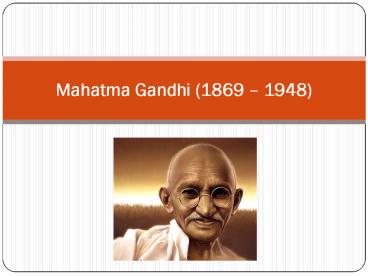Essay on Mahatma Gandhi - PowerPoint PPT Presentation
Title:
Essay on Mahatma Gandhi
Description:
An Individual who dedicated his entire life for the nation and became role model by following the principles of truth and non-violence. – PowerPoint PPT presentation
Number of Views:369
Title: Essay on Mahatma Gandhi
1
Mahatma Gandhi (1869 1948)
2
Essay on Mahatma Gandhi
- The anniversary of the birth of Mahatma Gandhi
(Gandhi Jayanti) is celebrated on October 2 as a
national event throughout India. This day is
observed throughout the world as the
International Day of Nonviolence. Mahatma Gandhi
has contributed untiringly and selflessly to the
struggle for independence for independence. - The ideals of Mahatma Gandhi were Satya (truth)
and ahimsa (nonviolence). For his philosophy of
truth and nonviolence, he paved the way for
India's independence from the British. Mahatma
Gandhi was named as the father of the nation. It
was the harbinger of hope not only for India but
for the world.
3
- Mahatma Gandhi not only made a significant
contribution to India's fight against the British
for freedom, but through his iconoclastic vision,
he urged people all over the world to confront
any form of Discrimination, whether by caste ,
color, little. - The profound quote of Mahatma Gandhi, "The best
way to meet is to lose yourself in the service of
others", sums up correctly his important selfless
contribution to India. Mohandas Karamchand
Gandhi, an iconoclastic and disinterested man,
was born on October 2, 1869 in Karamchand
Uttamchand Gandhi and Putlibai, in a family of
Hindu merchant castes in Porbandar, Gujarat state.
4
- He practiced law for a year at the University of
Bombay, then was transferred to University
College London, where he graduated in 1891.
Mahatma Gandhi was admitted to the law school of
England. He practiced law in Bombay (now Mumbai)
for a year before traveling to South Africa,
where he was a victim of racism. - Mahatma Gandhi used nonviolent civil disobedience
for the first time in South Africa as part of the
struggle of the Indian civil rights community.
His nonviolence and his satyagraha were the tools
with which he could lead India to independence
without spilling a drop of blood.
5
- Mahatma Gandhi inspired people with his famous
phrase "Be the change you want to see in the
world. - He practiced nonviolence, truth and self-control.
While in London, he became more committed to a
vegetarian diet and encouraged others to adopt a
vegetarian diet as well. The father of the nation
believed in simple life and high thinking. He
lived simply, wore a traditional Indian dhoti and
a shawl woven from wool spun by hand in a
charkha. He abstained from eating meat, alcohol
and promiscuity. Mahatma Gandhi made long fasts
to mark his opposition to political protest.
6
- In 1916, Mahatma Gandhi was arrested for
organizing the civil resistance of tens of
thousands of landless peasants and serfs in the
district of Champaran, Bihar, India. Through the
Champaran Satyagraha of 1916, Mahatma Gandhi and
the farmers and serfs opposed the increasing
British tax on farmers during the devastating
famine. - With his determination, Gandhi surprised the
British in 1930 with his 440 km walking towards
the sea to oppose the British monopoly of salt
and led the Indians to question the salt tax
imposed by the British. The Dandi Salt Walk is a
record of history and about 60,000 people were
imprisoned after Dandi's departure.
7
- Gandhi believed that all human beings are special
persons of God and that they should be treated
equally, regardless of their caste, color,
language, creed, region, religion and ethnic
origin. Mahatma Gandhi believed in religious
pluralism and campaigned for the empowerment of
the untouchables, whom he called the Harijans
(children of God). In 1942, Gandhi urged the
Indians to stop cooperating with the British and
called for the Quit India movement.
8
- However, India's struggle for independence lasted
a long time and many people sacrificed their
lives during this process. India finally gained
freedom in August 1947. But independence was
followed by the terrible partition. - After the partition and the witnesses of
religious violence related to the creation of
India and Pakistan after the independence of
India in 1947, Gandhi carried out innumerable
fasts until death to put an end to religious
violence. . The father of the nation was killed
on January 30, 1948, after Nathuram Godse fired
three bullets at Birla House in New Delhi.
9
- The father of the nation was a well-read man and
a passionate writer. His philosophy of ahimsa,
satyagraha and civil disobedience remains a
powerful philosophy in people's lives and has
helped people around the world to gather the
courage to oppose discrimination. -
-www.jaborejob.com

